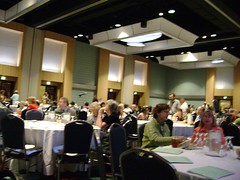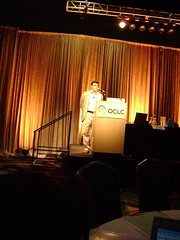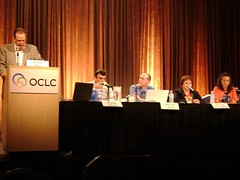Mixing It Up: The Mashed Up Library (OCLC Symposium)

Lots of round tables (easy laptop blogging – if there was free wireless) and people in a big room. Sitting down, we each got an OCLC bag – way prettier than our orange ALA bags – and a packet of information. Andrew Pace started it off with an introduction to the speaker and panelists as well as the concept of mashups. He pointed out to us two cards that are labeled “Resource†and “Challenge†in our packet o’stuff – we are to jot down all of our resources & challenges that we can think of as the speakers talk, then we can share them later.
He discussed some mashups (Dewey + John Ashcroft = Sienfeld’s Library Cop; OCLC Connection + WoW = WorldCat of Warcraft). Finally, he introduced Michael Schrage to start off the “official†part of the afternoon.
 Michael Schrage:
Michael Schrage:
Institutional Innovation, Mashups and the Library Future
• “the content of the audience is more important than the content of the talkâ€
• Institutional Innovation
• Operational definition of Innovation – conversion of ‘novelty’ into ‘value’
o Novelty – to whom? Value – for whom?
• Innovation is a means to an end
• Innovation isn’t what innovators offer – it’s what customers, clients & users adopt
o Cell phone example – only 10% of users use more than 50% of features – those features aren’t innovative, they are wasteful
• From ‘creation of choice’ toward ‘value from use’
o Make innovative focus value, not novelty
• “What’s the most innovative thing you think we do?†– start innovation process with that question
o What is the perception of *you* on an organizational level
• Institutional side
• Intelligence is wildly overrated as a virtue
o Self-delusion is biggest obstacle to innovation
• Wikipedia: Mashup definition
o Brings same interoperability to data sets that Internet brought to networks
• Interoperability
• The most important product of the mines…
o Is the miner
o Frederick Le Play
o Human capital most valuable product
o “The most important product of the network is the networkerâ€
o The kinds of networks we build, depend on what kind(s) of Networkers we want people to be
o What is the most important product of the library…?
 “A scholar is a library’s way of creating another library†(Daniel Dennet)
 What should the most important products of the library be?
• Libraries = Gyms for the mind
• Competition – like innovation – is a means to an end
• Competition is about perceived value from choice
• How do you users and user communities brand you as a competitor
o As info access providers, we are in most competitive industry in the world
• 4 things as takeaways
o Learning from our ‘lead users’ (who are they? How do we know?)
o With whom do we want to collaborate to create value? Why?
o Marketing our best internal arguments/disagreements (transparency is good)
o Establishing ‘liberatories’ that attract talent and inspire hypotheses (liberatories = library + laboratory)
• Success comes not from taking the path of least resistance, but the path of maximum advantage…
Questions:
Mention of Adaptive Path & “experience is the product†– could our library’s product be the experience we provide? Michael thinks that is a great answer – but what group(s) of people will define the notion of experience? Who is the experience economy “person†at your library? Is your board capable of overseeing quality of experience? What institutional investments can you make?
Making the library better = letting our users/patrons create in our library (reviews, tags, comments, etc.). Michael suggests encouraging or even forcing them to produce content so that the more the library is used, the better it gets
 Panel: Libraries In Action – David Lee King, Mary Beth Sancomb-Moran, Susan Gibbons
Panel: Libraries In Action – David Lee King, Mary Beth Sancomb-Moran, Susan Gibbons
Climbing out of the box
• Intro to his daughter’s “outside the box†experience – took a box and made a 2 story dollhouse with attic window and porch swing.
• Intro to his library’s website (very cool stuff…)
o Meebo widget – used by PCC patrons so they don’t waste computer time
o They have a bookmobile/gmap Mashup too!
o Physical/digital library mashups
• Poking holes in the box
o Patron comments to library’s site (most pages)
o Original content by patrons (teen poetry & articles written by patrons), videos by patrons
• Outside the box (mashing up our community)
o Go outside the library
o Bookmobile, google blog search alerts/technorati/twitter, etc.,
• Comfortable with 2.0?
• Community brainstorming session
• Books + people + 2.0 = ?
Mary Beth Sancomb-Moran
Map MashUps
• Minnesota Sesquicentennial banner and journal
o Banner traveled through state to public libraries
o Routed through 11 counties & 35 public libraries in southeastern MN
o Created google map to show when/where banner would be visiting near patrons
• Advocacy
o Library legislative day
o Getting their attention & informing them
o Useful for legislators & patrons
o Read posters with each legislator’s picture for their office
o Created map Mashup for each legislator with list of libraries in their area
Susan Gibbons
 CoURses System – mashing registrar course data w/ best library resources
o Voyager data
o E-journal list
o Database list
o Librarians
o Course, not subject, guide
 Course guide – section by section introduction, mashed up information from lots of places for each course
 Mashing up people
o Writing consultants/Student Advisors/Librarians – cross training so the librarians can do some writing consulting or student advising – and vice versa
o Most valuable staff on campus
Q&A time
Andrew asked about letting others use our data in mashups
David said that his RSS feeds are getting scraped with minimal credit, Mary said that they are moving that way – cautiously, Susan said that they would, cautiously – for noncommercial purposes only!!
Who is creating the widgets for David’s library & what kind of training do they get? Web dept, Meebo widget was very easy, no training required, Google Map widget is similar, not much training required – they figured it out without training.
Michael brought up the point of widget makers (Meebo, Google) having access to your patron’s info and may monetize it.
Can we make available data that we lease, not own? Susan said it’s probably already happening…
Are Tech Serv (catalogers) involved in these innovations? How are you managing staff time to prevent backlogs? Mary Beth just played to figure out and gave to web guys to implement, no tech serv folks involved. Susan said that looking for automation possibilities or find efficiencies in the process. David said that they organize around the work, not the department. One tech serv person is in charge of MySpace, one is Second Life person, etc. If they want the project, they get it, whether it “fits†their department or not.
Battery’s going – have to shut down!